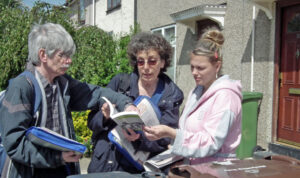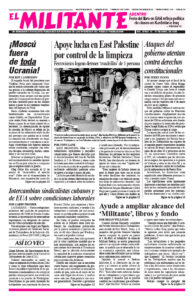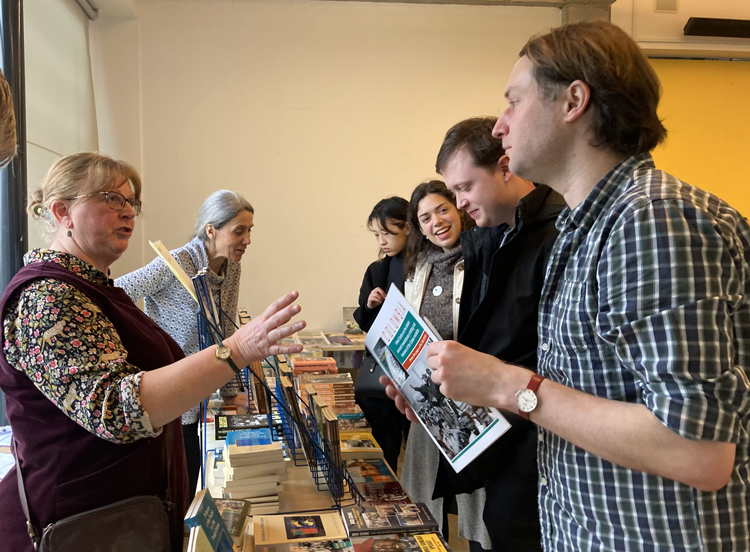LONDON — More than 60 people gathered here March 26 to celebrate the life and political contributions of Communist League leader Celia Pugh. A 52-year veteran of the communist movement, she died March 4 after a long illness at 70.
Participants included her long-time partner Pete Rosner, her two brothers and sister, their partners, as well as others who had journeyed from France, Belgium, Norway, Northern Ireland and the U.S. Twenty-five messages to the meeting were displayed from people who had worked with Pugh from North America, the South Pacific and elsewhere in Europe. A four-panel display highlighted her part in working-class battles and party building.
Communist League leaders Jonathan Silberman and Ólöf Andra Proppé, and Mary Martin, a leader of the Socialist Workers Party in the U.S., spoke at the meeting. Proppé is a rail worker and has been part of a series of recent national strikes held by the Rail Maritime and Transport union to fight for better wages and to oppose job cuts. The meeting was chaired by CL leader Catharina Tirsén, just returned from Iraqi Kurdistan where she was part of an international team presenting books by communists and other revolutionary leaders at the Pathfinder stand at the Erbil book fair.
“Celia’s determination not to stand on the sidelines but to get involved in the class struggle was decisive to her becoming a communist,” Silberman told participants. He, Pugh and Rosner had joined the International Marxist Group at Essex University in the course of big working-class battles. In January 1972 Pugh helped lead an occupation of the university that enabled some 250 striking miners to be billeted there and use the campus as a base to picket nearby power stations. The nationwide strike, marked by mass picketing, led to miners winning a significant pay raise.
“It’s the first time I had heard of the miners strikes,” Gabriella Adeyemo, a factory cleaner in London who attended the meeting, said. “It was great how Celia took solidarity.”
Weeks later Pugh and fellow students joined a London demonstration protesting the killing of 14 civil rights protesters in Derry, Northern Ireland, by British soldiers, known as Bloody Sunday. In March of the same year, Pugh organized solidarity for women shoe workers at Fakenham, Norfolk, inspired by the rising women’s liberation movement. They’d occupied the factory to fight for jobs.
Turn to industrial unions
Working-class battles like this, alongside revolutions in Grenada, Nicaragua and Iran convinced the world communist movement to organize to get a majority of its members into the industrial unions in 1979. Pugh was at the forefront of the effort to build parties that were proletarian in program, composition and conduct.

In 1980 she moved to Cardiff, South Wales, leading efforts to organize solidarity with the 14-week national steel strike. She built relations with strikers, writing part of a pamphlet about the strike, called “Steel women’s power.” At the same time, as miners were preparing battles that were to culminate in the 1984-85 strike, Pugh led party branches in building political relations with coal miners throughout the area. In later years she lived in Manchester, Nottingham, and London.
“Celia never hesitated to move where the party needed,” Safia Ouabaio, from Amiens, France, told the Militant after the meeting. She did so, wrote Communist League leader Tony Hunt in a message to the meeting, because she wanted to do whatever was necessary “to build the only kind of party that can lead the exploited and oppressed to making a revolution.”
“The fight to carry out the turn to industry led to the formation of the Communist League in 1988,” Silberman said.
The turn required “strengthening our understanding of the foundations of the modern communist movement,” Martin explained in her presentation. “So we’re better able to explain the history of our class and the road to taking power.” In 1985 Pugh was the first communist from the U.K. to participate in the Socialist Workers Party’s leadership school in the U.S., taking six months away from day-to-day responsibilities to study works by Karl Marx and Frederick Engels.
“Such international collaboration is central to all our work,” Martin said.
SWP leader Norton Sandler was at the same session of the school as Pugh. “Celia threw herself into the study of Marxism,” he wrote in a message to the meeting. And she “contributed over many years to the rich political continuity our international movement builds on today,” providing “solid foundations to take advantage of new opportunities that are coming with the low point of labor resistance behind us.”
One example, Martin pointed to, is what is unfolding in East Palestine, Ohio, after the derailment of a train carrying toxic chemicals. “Working people are fighting to gain control over the cleanup, a fight that goes hand-in-hand with the struggle of rail workers for control over job conditions that are crucial to their lives and the lives of those living near the tracks.”
“Many messages to the meeting speak of Celia’s capacities as a ‘tribune of the people,’” Silberman said, “reacting to all cases of tyranny and oppression wherever it occurs.” Displays at the meeting featured photos of Pugh as a CL parliamentary candidate, campaigning in working-class areas and writing on countless occasions and on many issues for the Militant.
An important highlight, Silberman said, was her response to “revolutions in Grenada and Nicaragua that established workers and farmers governments, joining Cuba in standing up to imperialism.” A counterrevolutionary coup was carried out in Grenada in 1983 by a Stalinist faction in the government. “Maurice Bishop and other central leaders were murdered, giving Washington an opening to invade.
Defending Maurice Bishop’s legacy
“Celia took central responsibility for leading the movement in the U.K. to defend Bishop’s legacy in the face of a slander campaign orchestrated by Stalinist parties around the world,” Silberman said. She worked with George Louison, former agriculture minister in the revolutionary government, who was then living in London. “Celia and George went house to house spending hours explaining the truth to Grenadians and others from the Caribbean who were living in London.”
In 1988 Pugh joined a voluntary work brigade to Cuba, Proppé said. The trip took place during the rectification process, a movement led by Fidel Castro to reverse the consequences of copying political methods long dominant in the Soviet Union, to lead working people to take greater control over their state and address unmet social needs. In the Militant that July, Pugh wrote she would join Cuban workers “constructing foundations for family doctor clinics, houses and other building projects.” After returning, Proppé said, “Celia helped organize several tours of Cuban revolutionaries to the U.K.”
In 2010 Pugh started to suffer from dementia. The League worked with her to continue a fruitful political life, for as long as possible. She worked in the McVitie’s biscuit factory until late 2014, Silberman said. “She could do the job but was unsure how to find which line she should work on. Her workmates ensured she was able to get there.”
Martin described a visit she’d made with Pugh to London’s world-renown Kew Gardens in 2016 while she was visiting the U.K. with SWP presidential candidate Alyson Kennedy. “This experience taught me something about utilizing the capacities of comrades at whatever stage of their life,” Martin said. “To carry forward the work of the party and to get enjoyment. Celia knew all the best places to visit.”
Participants contributed 2,000 pounds ($2,470) to the work of the League at the meeting. Many stayed around afterward poring over the displays, chatting and enjoying delicious refreshments.
“I got a real sense of history from the meeting,” Thom Hutchinson, a media project coordinator, told this reporter, “one that’s carried over to today.” He picked up a copy of The Turn to Industry: Forging a Proletarian Party by SWP leader Jack Barnes to learn more.
Roman Laniel, a student from Amiens, France, was one of those at the meeting. He’s joined union-led actions protesting the French government’s moves to raise the retirement age. Like several people at the meeting he never met Pugh, but “through the speeches I got to know her, the political experiences of working people that were related and we are part of today.”


